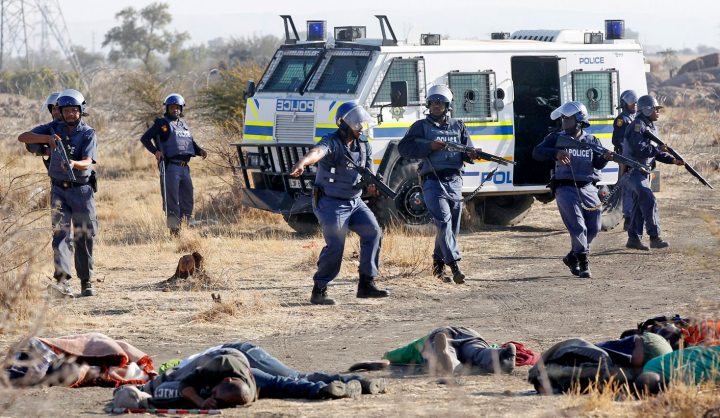South Africa
Marikana Commission: Gung-ho Mangwashi Phiyega under scrutiny

The appropriateness of police action on 16 August 2012 was once again the focus of the Marikana Commission of Inquiry – under particular scrutiny were comments made by national police commissioner Mangwashi Phiyega soon after the massacre that left 34 miners dead, in which she praised police action. By SIPHO HLONGWANE.
National police commissioner Mangwashi Phiyega may soon come to regret statements she made during the week after the police shot and killed 34 miners, and wounded 78 others, at the Lonmin mine in Marikana.
At the commission of inquiry called by President Jacob Zuma to investigate the tragedy, a video was shown of Phiyega speaking after the massacre and lawyers questioned police witness Brigadier Zephaniah Mkhwanazi, a public order policing (POP) skills development facilitator.
SA Human Rights Commission lawyer Nokukhanya Jele questioned the timing of Phiyega’s comments, asking whether it would not have been wise to wait before praising the police. The brigadier declined to answer, and commission chairman Judge Ian Farlam agreed that this was a point to put to the woman who actually made the comments.
The video showed Phiyega speaking at the funeral of Warrant Officer Sello Ronnie Lepaku after he was allegedly killed by striking Lonmin miners.
“Safety of the public is not negotiable. Don’t be sorry about what happened,” she said.
After urging the police to be vigilant and to wear bulletproof vests, shields and helmets at all times, she said: “We confront, every day, heartless criminals who are gunning for our lives. You can put yourselves in danger a thousand times and come out unscathed or just once and not make it. You never know in advance how things will turn out, and that is our line of work.
“Mourning as we are, let us take note of the fact that whatever happened represents the best of policing.”
Though Mkhwanazi’s cross-examination was cut short, it appears very likely that the top brass will be called in to explain why certain orders were given and why the operation was carried out in the way that it was.
Following the highly-publicised shooting of protester Andries Tatane in 2011, police brutality has been the focus, especially in light of comments made by Phiyega’s predecessor and Susan Shabangu back when she was deputy safety and security minister.
According to a directive published by City Press, police minister Nathi Mthethwa wanted the police to use less force.
The document says: “Less lethal methods to manage crowds must be implemented. Negotiations are still the first resort. A gradual response such as the use of pyrotechnics, water cannons and the 40mm launcher must then be used.
“The purpose of offensive actions must be to de-escalate conflict with the minimum level of force to accomplish the goal. The degree of force must be proportional to the seriousness of the situation and the threat posed in terms of situational appropriateness. The use of force must always be reasonable in the circumstances and force must be discontinued once the objective has been achieved.”
In 2009, Mthethwa tried to get section 49 of the Criminal Procedure Act amended to make it easier for the SAPS to use deadly force – and was supported by Zuma, according to BusinessDay. These words and actions by the political leadership have encouraged the police to use deadly force at any time, according to critics.
Mkhwanazi was also questioned on the number of specially-trained police that were called in to assist in the Marikana operation. Jele put it to the brigadier that there were only 170 public order police facing over 3,000 protesters that day, despite the fact that there were 1,314 POP available in Gauteng and Limpopo at the time. The police relied on reinforcements from units not trained to handle public crowds.
The police have defended their actions since then, saying that they were forced to shoot miners in self-defence. Some evidence unearthed at the commission shows that the police may have attempted to plant weapons on some of the dead miners.
Advocate Dumisa Ntsebeza (for the families of the deceased) questioned Mkhwanazi on why he did not specifically ask to view video footage taken in Marikana, at the nine-day debriefing session that the police had in Potchefstroom following the massacre. He said that the stand-off could have been better contained had it been handled exclusively as a POP operation, as a POP-trained negotiator would have seen that the protesters were not intent on violence, and would have negotiated better – with a peaceful resolution as an outcome.
Lawyers representing several interested parties (including the surviving miners and the families of the deceased) have previously said that they will argue that had the right number of properly-trained police been part of the 16 August operation, it would not have been necessary for them to resort to maximum force to quell the striking miners.
The inquiry continues. DM
Photo:A policeman gestures in front of some of the dead miners after they were shot outside Marikana, August 16, 2012. REUTERS/Siphiwe Sibeko














